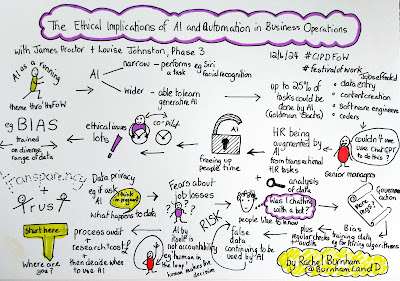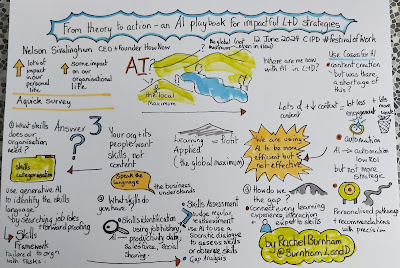Rachel writes: I was at the CIPD's FestivalOfWork last week at Excel in London. And what a wonderful event it was - lots of people, lots of conversations - a vibrant and lively atmosphere. This event is now a free event and all the better for it. The new venue worked a treat for the larger number of participants- the exhibition and sessions were busy, but I never felt crowded. A great range of topics were on the agenda in the multiple stages - business transformation, learning & development, wellbeing, equalities, internal communications, ethics and so on. My only quibble is that most of the sessions were only 30 minutes in length - I would love to see some longer sessions, in addition to the keynotes, where topics are explored in greater depth.
I Sketchnoted 8 sessions over the course of the two days - here they are:
The first session I took part in was on the subject of 'The Ethical Implications of AI and Automation and was presented by James Proctor and Louise Johnston of Phase 3 - a Manchester based company. This was one of a number of sessions exploring different aspects of the use of AI in organisations and the changes that we are facing in our working lives.
This session brought out both some of the benefits, but also some key ethical issues to consider in using AI such as risks of bias, issues of transparency and trust, data privacy and concerns about job losses. James and Louise emphasised the value of people and AI working together - the copilot model. I particularly liked the phrase 'human in the loop' which is about designing in that it is always a person that makes the decisions, when using AI applications.
Lutfur began by considering the future of Equalities, Diversity and Inclusion in the context of the backlash against EDI, what some of the reasons for this vocal backlash are and what the reality of EDI is in organisations. He encouraged us to work on 'developing a shared understanding' but also to simplify the language we use to ensure that it is understandable and accessible for managers throughout our organisations and doesn't act as a barrier to action for them. He challenged us to focus on 'Equality of outcome and impact' and recognise that organisational culture - particularly aspects such as wellbeing & psychological trust are vital and equality is not just about 'representational diversity'.
I was particularly struck by the statistic shared by Liz Williams MBE that only 4 in 10 people are planning to upskill their digital skills this year. This seems astounding and shocking in equal measure, giving how fast things are developing in the field of technology. She cautioned us in developing our organisation's digital skills to focus more on where we are now and guided us to the framework for 20 key digital skills which can be accessed on the FutureDotNow website. This was a key takeaway from the event for me.
Rachel
Burnham
17 June 2024
I help
individuals and organisations to use visuals to think, learn and work more
effectively, particularly though using Sketchnoting and drawing.








